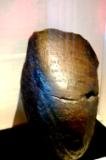They say all that glitters is not gold. Sometimes it’s just a reflection of the sun on the water or the dazzling reflection of a temple’s roof in the afternoon sun. And before you let those things blind your eyes and cloud your judgement about gold and jewellery, it’s best to go find out a bit more about them. Most especially if you are a muthu who could not tell a manikam from a meenachi.
Some may adhere to the saying, mother knows best. I will not argue with that although I must say that mother only knows best about certain things. While some mothers can be down right experts in the field of jewellery purchasing, I must also add that there have been numerous occasions when mothers have made their way to my office to lodge complaints that they have been cheated by unscrupulous jewellers in Thailand.
Since I am no expert on jewellery either, having bought only one ring in all of nearly 50 years, it is certainly not my intention to teach shoppers how to buy such items. Of course, I am not counting the rings bought from sellers of trinkets on the roadside.
And having over the last 10 years had to help solve problems of people who felt they were getting a bad bargain after having bought such items, especially from jewellery shops in Bangkok, I certainly feel I should say something about it.
The advice summarised below are taken from the Jewel Fest Club’s written guide on how to buy gems in Thailand. The Jewel Fest Club was set up several years ago following numerous complaints from the public, especially foreign tourists to Thailand, that they have been cheated when buying jewellery. Members of the Jewel Fest Club are those who felt that not all jewellers should be branded as cheats and that members of the club are honest in their dealings. Or at least if customers should later find their purchases to be unsatisfactory, they can easily return them and get a refund. How much refund would of course depend on the length between the period the complaints were lodged and the purchases were made.
However, the best advice that I can give you is not to rely on other people’s advice solely, all the more so if you are not an expert on gemstones and jewellery. Always be on the side of caution. It could save a whole lot heartache later on, not just for you but for the person who has to entertain to your complaints.
As I said this is by no means a complete guide to gem buying, but it is hoped that it would give you a better understanding of jewellery before you go splash your year-end bonus or three-month’s pay cheque.
To start with, be aware of the weight and percentage of gold in jewellery, meaning the heavier and more percentage, the more expensive. In other words, take into account the weight, size, amount and quality of gems. Here the principle of the 4Cs should be applied. The 4Cs should not be confused with the term used in Singapore, which is CONDO, CASH, CREDIT CARD and CAR as a sign of a man’s eligibility as a husband. Anyway, buyers of jewellery should consider the weight of each gemstone because a single, large gemstone is more expensive than several small ones.
As mentioned earlier there are four criteria to judge gems known as the 4Cs. Firstly COLOUR. For diamond, the clearer and whiter, the more expensive. But for other gemstones, it is more difficult to evaluate. There are many kinds of gemstones and there has never been a single standard to judge them, unlike diamond.
Sapphire, for example, is a kind of blue gemstone. The most valuable kind of sapphire possesses a blue velvet colour while sapphires with much lighter or darker shades are relatively cheaper.
Ruby is normally red but the standard colour is vermilion. Paler or darker shades are slightly cheaper.
Emerald is a green velvet stone and the cheapest kind is the one that is light green, approaching yellow. And although they look almost the same green to the untrained eye, emerald should not be confused with jade. Put a piece of jade to your cheek and if it is cold, then it’s jade. Or so I was told. Another criteria is that jade are usually set in rounded forms while emerald can be cut into different shapes such small as squares.
To buy gemstones with their colours as the main criterion, customers should look for those with medium shades, not too light and not too dark. They can also seek an expert’s advice before making a decision. (The experts should not include university students you meet on the road or finely-dressed gentlemen in temples, or worse still, people masquerading as temple caretakers, for example).
Second of the C is CLARITY, which actually concerns the level of contamination inside a gemstone. The less contamination and fewer defects a gem has, the more expensive it is. Sounds easy enough, right?
Thirdly is the CUT, which basically is the shape and balance of the gem facets. A quality cut creates a glittering reflection inside a gem.
Fourth, of course, is the CARAT WEIGHT. Quality gems are priced by their carat weights while inferior ones are priced by unit tagged with a fixed price. One carat weighs 200 milligrams.
Then we come to the craftsmanship and designs. These should be self-explanatory. As they say, beauty is in the eye of the beholder. Some may prefer say an uncluttered small piece of ring like a wedding band while others may like to have something which resembles a deadly weapon.
Last but not least is buyer’s satisfaction. As jewellery is an art, there is no standard of pricing. Buying depends on the taste and satisfaction of individual buyers. Which is why as a word of caution, buyers should try and go to a standard jewellery shop and after making a purchase to request for receipts that clearly describe the details of the products, the dates of purchase, and the names of sellers, as well as for a warranty in order to prevent problems later on.
For more information, you can also visit the following websites:- http://www.jewelfest.com/ or http://www.thaigemjewelry.com/.
Wednesday, March 28, 2007
Friday, March 02, 2007
Coming to terms with your own greed
Imagine this. You’re walking with your husband or wife on a street in Bangkok. You’re taking a holiday after saving up for a few months. Tightening the belt every now and then just so that you can live it up a bit during your vacation. It is also a chance to spend a bit of quality time together and rekindle some romance. Nobody is getting on anybody’s nerve. He decides to overlook your buying all the things you do not need. She decides to overlook the fact that you are ogling the salesgirl. Nobody is coming home late from work. And nobody has to get dinner on the table after a full day’s work in the office. All is well in your neat little world and things can’t get any better.
But it can, according to a youth dressed in university attire (black pants and white shirt). Just around the corner is a temple housing a special Buddha image. The temple is open to the public only once a year, and only for a week. As your luck would have it this happens to be that particular week. Lighting incense sticks and prostrating before the image would bring you an eternity of good luck, says the youth, who was kind enough to direct you towards the temple.
As you enter the temple, there is a finely-dressed gentleman in office attire who had just finished his three prostrations before the said Buddha image. He smiled at you like the president of some exclusive club welcoming a new member. He is even prepared to advice you on what to do and how to pay your respects to the image of the noble one. You are grateful for the opportunity to usher in your good luck and do as you are told.
Then the gentleman discreetly tells you that during this period the government is having a jewellery promotion. In conjunction with the King’s birthday all the jewellery shops in Thailand are giving a 50 per cent discount on all items. But today is the last day of the promotion. A man sitting in a corner, who looks like the temple caretaker, suddenly chips in with his two bahts worth by confirming the gentleman’s statement. Well, if two people say it, then it must be the truth, you think. The man looks at his watch and tells you to hurry if you want to get something. There is a jewellery shop not too far from the temple. Again you cannot believe how lucky you have suddenly become. Prostrating before the Buddha image is already working wonders. Thanking him profusely you make your way out of the temple and there is a tuk-tuk and a driver on hand. The kind gentleman reappeared at your side to convince you that the tuk-tuk will get you to the jewellery shop in double time. To further prove his kindness he even gives the instruction in Thai to the driver to take you to the nearest jewellery shop. You marvel at the kindness of this gentleman who asks nothing in return. Seeing the joy on your face after coming into such good luck is payment enough for him. What an amazing chap and what an amzing stroke of luck on your part.
The two of you got into the tuk-tuk and in your heart you curse the Bangkok traffic jams for your delay in getting you to your destination. But not to worry, for a few traffic lights later the tuk-tuk stops in front of this impressive looking establishment. As if that is not enough, from the shop emerges another finely-clad gentleman, beaming from ear to ear. He can hardly wait for you to pay the tuk-tuk fare before ushering you into the shop. A lady steps up with a tray bearing drinks to quench your thirst.
The two of you feel like royalty as the salesman takes you from the diamond showcase to the ruby showcase. Then it’s off to the emerald showcase before finally stopping at the sapphire showcase. It is true, the salesman tells you. The jewellery shop is having a 50 per cent discount. Any item you buy today you can sell in your country for twice the amount. You make a few mental calculations and decide that selective purchases of a few items are not only worthwhile but may even pay for the whole vacation. Since the shop is treating you like royalty, it is beneath your dignity not to act like one. So you whip out not one but two gold cards from your wallet and hand them over to the kind salesman who promptly hand them over to the cashier. All payments duly made you gather your diamond necklace, ruby earrings, sapphire ring, emerald brooch and the receipt before heading out the door. You still cannot believe your stroke of good luck. Your ever efficient tuk-tuk driver is still lingering in front of the shop. So you hop in and tells him the name of your hotel. He is so kind his fare is also reasonable enough.
Upon returning home you decide to take the jewellery for an appraisal. The shop assistant tells you they are only worth about one-third of what you pay for them. That cannot be true. The stupid shop is making a mistake. So you go to another shop for a second opinion. The verdict is still the same. Suddenly there is a sinking feeling in the pit of your stomach. You pick up your phone and call the credit card company, trying desperately to stop payment. The lady who answers the phone tells you that that simply cannot be done. Payment has been made. Take up your case with the shop.
Suddenly a light bulb flash in your head. The light bulb that not once glimmered when you meet the university student, the finely dressed gentleman, the supposed temple caretaker, the tuk-tuk driver and the shop assistant. You decide to pay a visit to your local Tourism Authority of Thailand office. After all they are the ones who are going on and on about Thailand being the Land of Smiles, full of friendly people, where the food is great and the shopping stupendous. To be fair their promotions have never selectively state that only those with IQs above 220 are welcome in Thailand.
The receptionist you told your problem to points you towards the library, excused herself to go in search of the Public Relations person who is supposed to take care of such problems. He appears a few minutes later and introduces himself. Another Thai, you thought. By that time you no longer feel very warm towards all Thais and all things Thai. You swear you will never visit Thailand again, ever. You begin narrating your story but before you even get to the part about the men at the temple, he picks up the story and begins telling it at least up to the point where you arrive at the jewellery shop. You begin to get the feeling that this is not the first time he is hearing the story. You also cannot help feeling that he is less than sympathetic to your plight. He asks you to lodge a written complaint, which would then be forwarded to the head office and on to the appropriate people for further action.
You want to know if you can get back your money. Well about 85 per cent of it, he says, pointing to the fine print on the receipt that says all goods returned in good order within one month of purchase entitles you to only that amount of refund. You wonder how you missed that. He is non-committal when you ask how soon you can expect your money back. In fact you may even feel that he is not very helpful. So you ask why the government has not gone after these jewellery shops and close them down. The truth is for every shop closed down a few more will spring up with a different name and a different owner. How do you distinguish between the good ones and the bad ones? A group of people may have conspired to con you but until you put your signature on the credit card slip no transaction has taken place. They say you can lead a donkey to river but you can’t force the ass to drink. Horse, donkey or ass? Let us not debate too much about their biological differences, eh?
And if you are a muthu who doesn’t quite know which side of the manikam to look at, then before you whip out your gold cards next time, picture this. It is June in Malaysia. It is the Yang DiPertuan Agong’s Birthday. Do you ever remember the jewellery shops in KL or PJ or Penang having 50 discounts on their items to mark the occasion? If you are very sure that you cannot, then why in the world do you think jewellers in Thailand would act in such an unselfish fashion? What is using the name of the King in such a disrespectful manner if even the Buddha is desecrated by these people in such a fashion?
As an after thought, Prince Siddharta who went in search of the truth and finally found enlightenment and Buddhahood over 2500 years ago never ask that you prostrate yourself before his statue to reap good luck. His advice was to use your brain and power of intellect and learn to think for yourself. That is the way to change your luck. And of course, learning to let go. Letting go of greed and stupidity would surely be very high on that list. Prostrating yourself three times in front of any Buddha image is all fine and well. It is a mark of respect to a great man, to his teachings and to the sangha or body of monks who are keeping his teachings alive. Don't do it just to reap good luck as though that is your divine right. The Buddha passed away a long time ago. He no longer exists. He is powerless to change your luck. But his teachings can help pull you out of that mire of stupidity which is very often mistook for affluence.
But it can, according to a youth dressed in university attire (black pants and white shirt). Just around the corner is a temple housing a special Buddha image. The temple is open to the public only once a year, and only for a week. As your luck would have it this happens to be that particular week. Lighting incense sticks and prostrating before the image would bring you an eternity of good luck, says the youth, who was kind enough to direct you towards the temple.
As you enter the temple, there is a finely-dressed gentleman in office attire who had just finished his three prostrations before the said Buddha image. He smiled at you like the president of some exclusive club welcoming a new member. He is even prepared to advice you on what to do and how to pay your respects to the image of the noble one. You are grateful for the opportunity to usher in your good luck and do as you are told.
Then the gentleman discreetly tells you that during this period the government is having a jewellery promotion. In conjunction with the King’s birthday all the jewellery shops in Thailand are giving a 50 per cent discount on all items. But today is the last day of the promotion. A man sitting in a corner, who looks like the temple caretaker, suddenly chips in with his two bahts worth by confirming the gentleman’s statement. Well, if two people say it, then it must be the truth, you think. The man looks at his watch and tells you to hurry if you want to get something. There is a jewellery shop not too far from the temple. Again you cannot believe how lucky you have suddenly become. Prostrating before the Buddha image is already working wonders. Thanking him profusely you make your way out of the temple and there is a tuk-tuk and a driver on hand. The kind gentleman reappeared at your side to convince you that the tuk-tuk will get you to the jewellery shop in double time. To further prove his kindness he even gives the instruction in Thai to the driver to take you to the nearest jewellery shop. You marvel at the kindness of this gentleman who asks nothing in return. Seeing the joy on your face after coming into such good luck is payment enough for him. What an amazing chap and what an amzing stroke of luck on your part.
The two of you got into the tuk-tuk and in your heart you curse the Bangkok traffic jams for your delay in getting you to your destination. But not to worry, for a few traffic lights later the tuk-tuk stops in front of this impressive looking establishment. As if that is not enough, from the shop emerges another finely-clad gentleman, beaming from ear to ear. He can hardly wait for you to pay the tuk-tuk fare before ushering you into the shop. A lady steps up with a tray bearing drinks to quench your thirst.
The two of you feel like royalty as the salesman takes you from the diamond showcase to the ruby showcase. Then it’s off to the emerald showcase before finally stopping at the sapphire showcase. It is true, the salesman tells you. The jewellery shop is having a 50 per cent discount. Any item you buy today you can sell in your country for twice the amount. You make a few mental calculations and decide that selective purchases of a few items are not only worthwhile but may even pay for the whole vacation. Since the shop is treating you like royalty, it is beneath your dignity not to act like one. So you whip out not one but two gold cards from your wallet and hand them over to the kind salesman who promptly hand them over to the cashier. All payments duly made you gather your diamond necklace, ruby earrings, sapphire ring, emerald brooch and the receipt before heading out the door. You still cannot believe your stroke of good luck. Your ever efficient tuk-tuk driver is still lingering in front of the shop. So you hop in and tells him the name of your hotel. He is so kind his fare is also reasonable enough.
Upon returning home you decide to take the jewellery for an appraisal. The shop assistant tells you they are only worth about one-third of what you pay for them. That cannot be true. The stupid shop is making a mistake. So you go to another shop for a second opinion. The verdict is still the same. Suddenly there is a sinking feeling in the pit of your stomach. You pick up your phone and call the credit card company, trying desperately to stop payment. The lady who answers the phone tells you that that simply cannot be done. Payment has been made. Take up your case with the shop.
Suddenly a light bulb flash in your head. The light bulb that not once glimmered when you meet the university student, the finely dressed gentleman, the supposed temple caretaker, the tuk-tuk driver and the shop assistant. You decide to pay a visit to your local Tourism Authority of Thailand office. After all they are the ones who are going on and on about Thailand being the Land of Smiles, full of friendly people, where the food is great and the shopping stupendous. To be fair their promotions have never selectively state that only those with IQs above 220 are welcome in Thailand.
The receptionist you told your problem to points you towards the library, excused herself to go in search of the Public Relations person who is supposed to take care of such problems. He appears a few minutes later and introduces himself. Another Thai, you thought. By that time you no longer feel very warm towards all Thais and all things Thai. You swear you will never visit Thailand again, ever. You begin narrating your story but before you even get to the part about the men at the temple, he picks up the story and begins telling it at least up to the point where you arrive at the jewellery shop. You begin to get the feeling that this is not the first time he is hearing the story. You also cannot help feeling that he is less than sympathetic to your plight. He asks you to lodge a written complaint, which would then be forwarded to the head office and on to the appropriate people for further action.
You want to know if you can get back your money. Well about 85 per cent of it, he says, pointing to the fine print on the receipt that says all goods returned in good order within one month of purchase entitles you to only that amount of refund. You wonder how you missed that. He is non-committal when you ask how soon you can expect your money back. In fact you may even feel that he is not very helpful. So you ask why the government has not gone after these jewellery shops and close them down. The truth is for every shop closed down a few more will spring up with a different name and a different owner. How do you distinguish between the good ones and the bad ones? A group of people may have conspired to con you but until you put your signature on the credit card slip no transaction has taken place. They say you can lead a donkey to river but you can’t force the ass to drink. Horse, donkey or ass? Let us not debate too much about their biological differences, eh?
And if you are a muthu who doesn’t quite know which side of the manikam to look at, then before you whip out your gold cards next time, picture this. It is June in Malaysia. It is the Yang DiPertuan Agong’s Birthday. Do you ever remember the jewellery shops in KL or PJ or Penang having 50 discounts on their items to mark the occasion? If you are very sure that you cannot, then why in the world do you think jewellers in Thailand would act in such an unselfish fashion? What is using the name of the King in such a disrespectful manner if even the Buddha is desecrated by these people in such a fashion?
As an after thought, Prince Siddharta who went in search of the truth and finally found enlightenment and Buddhahood over 2500 years ago never ask that you prostrate yourself before his statue to reap good luck. His advice was to use your brain and power of intellect and learn to think for yourself. That is the way to change your luck. And of course, learning to let go. Letting go of greed and stupidity would surely be very high on that list. Prostrating yourself three times in front of any Buddha image is all fine and well. It is a mark of respect to a great man, to his teachings and to the sangha or body of monks who are keeping his teachings alive. Don't do it just to reap good luck as though that is your divine right. The Buddha passed away a long time ago. He no longer exists. He is powerless to change your luck. But his teachings can help pull you out of that mire of stupidity which is very often mistook for affluence.
Subscribe to:
Posts (Atom)


















